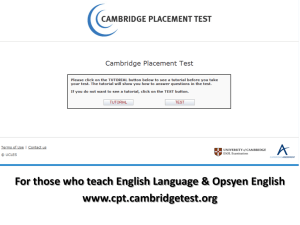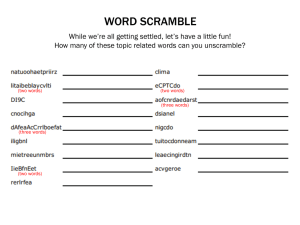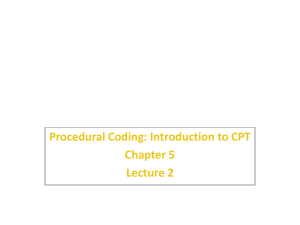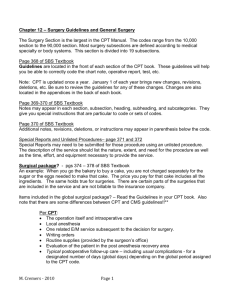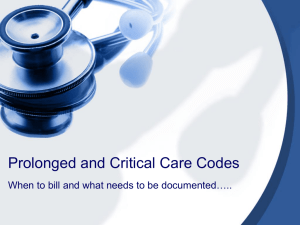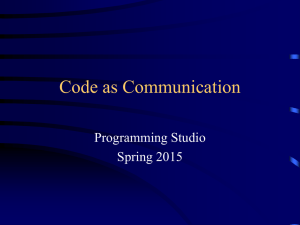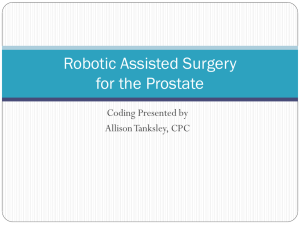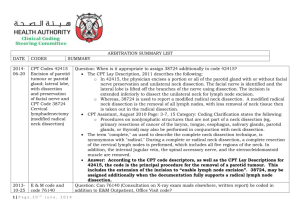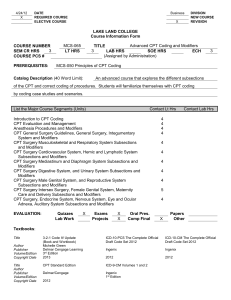Introduction to CPT Coding for
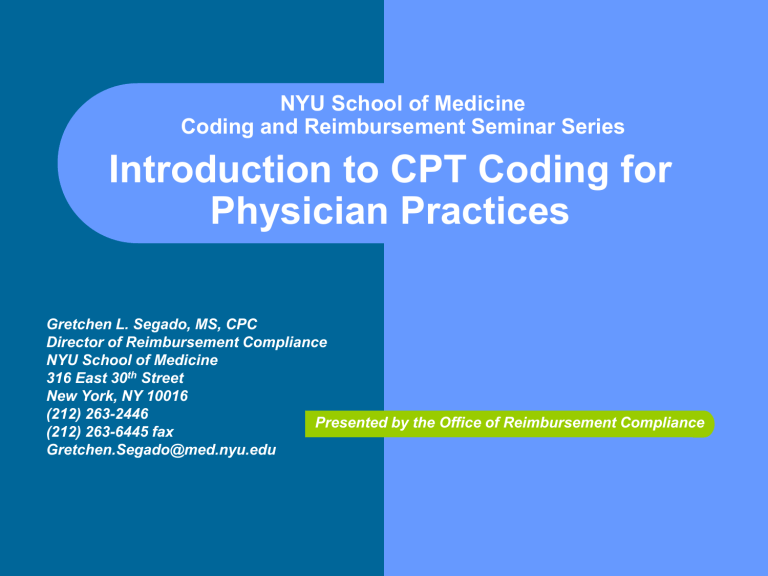
NYU School of Medicine
Coding and Reimbursement Seminar Series
Introduction to CPT Coding for
Physician Practices
Gretchen L. Segado, MS, CPC
Director of Reimbursement Compliance
NYU School of Medicine
316 East 30 th Street
New York, NY 10016
(212) 263-2446
(212) 263-6445 fax
Gretchen.Segado@med.nyu.edu
Presented by the Office of Reimbursement Compliance
What Is CPT-4?
Systematic listing of procedures & services performed by physicians
Five-digit codes for procedures or services
Used to describe the physician’s services to a patient for diagnosis and treatment of the medical condition(s)
Codes and descriptive terminology developed and copyrighted by AMA CPT Editorial Panel
Linkage Between ICD-9 & CPT
CPT-4 represents the “WHAT” was done to the patient
Procedure------------------- 93010 (EKG)
ICD-9 represents the “WHY” it was done
Medical Necessity--------- 786.50
(Chest Pain)
Organization of CPT Manual
Text organized in 6 major sections
Evaluation and Management
Anesthesiology
Surgery
Radiology
Pathology and Laboratory
Medicine
(99201 - 99499)
(00100 - 01999,
99100 - 99140)
(10040 - 69990)
(70010 - 79999)
(80049 - 89399)
(90281 - 99199)
Guidelines
Presented at the beginning of each of the six sections
Provide information necessary to appropriately interpret and report the procedures and services contained in that section
In addition to guidelines, several subheadings or subsections also have special instructions unique to that section
Reading the guidelines and notes are critical to using CPT correctly
CPT Symbols
Revised CPT Code-Description has been substantially altered
New CPT Code
Codes that never stand alone
Appears during the 1 st year that the text is revised or added
Codes exempt from the 51 modifier, but that do not have designated add-on procedures or services
Format of the CPT-4
Developed as a stand-alone descriptions of the procedures
To conserve space, some are not printed in their entirety but refer back to a common portion listed in a preceding entry**
Example:
25100
25105 arthrotomy, wrist joint; for biopsy for synovectomy
25105 arthrotomy, wrist joint; for synovectomy
**Commonly referred to as “Indented Codes”
Who can tell me what CPT Code reads?
The book says
24102 with synovectomy
What is the full description of each of these codes?
20600* arthrocentesis, aspiration &/or injection; small joint, bursa or ganglion cyst
(e.g., Fingers, toes)
20605* intermediate joint, bursa or ganglion cyst (e.g., Temporomandibular, acromioclavicular, wrist, elbow or ankle, olecranon bursa
20610* major joint or bursa (e.g.,
Shoulder, hip, knee joint, subacromial bursa
Example 2
20661 application of halo, including removal; cranial
20662
20663 pelvic femoral
The Index-The Starting Point
Listed procedures in alphabetical order at the back of the manual
Index is organized by main terms
There are 4 primary classes of main entries:
– Procedure or service
–
–
–
Organ or anatomic site
Condition
Synonyms, eponyms or common abbreviation
CPT Index
Procedure or service
– Appendectomy
Organ or anatomic site
– Knee
Condition
– Renal Abscess
Synonyms, eponyms or common abbreviation
–
–
–
Bucca (cheek)
BAER (Brainstem Auditory Evoked Potential)
Whipple Procedure
Use of CPT-4 Manual
Select the name of the procedure or service that most accurately identifies the service performed:
– Example:
Surgery: operations and minor procedures
Medicine: diagnostic or therapeutic procedure
Radiology: radiographic study
Any physician can use any code in the CPT book.
Important!!!!!
The alphabetical index is NOT a substitute for the main text of the CPT Manual. Even if only one code appears, the user must refer to the main text to ensure that the code selection is accurate
In short…NEVER CODE FROM THE INDEX@!@!
10 Steps to Basic CPT Coding
1.
2.
3.
4.
5.
Read the source document. Never assume!
Using information in the record, analyze procedure statement provided by physician.
Identify main term and modifying terms
Locate main term in the CPT index
Look for subterms indented below the main term
Jot down the tentative code range for each procedure.
10 Steps to Basic CPT Coding
6.
7.
8.
9.
10.
Locate each tentative code in the book
Read any instructional notes and watch for diagnoses or specific procedures within code descriptions
Verify that the code matches the procedure statement provided in the record
Assign a modifier if necessary
Assign the code
Now it’s your turn to use what you’ve learned…….
Identify the service or procedure performed
Identify the organ involved
Identify the condition or key word
Procedure/Organ/Key Word
What is the code for a Whipple Procedure?
48150
Procedure/Organ/Key Word
What is the code for an upper gastrointestinal endoscopy with biopsy?
43239
You can find the same code looking under any of the terms “gastrointestinal”
“endoscopy” or “biopsy”
Procedure/Organ/Key Word
What is the code for a synovectomy of the metacarpophalangeal joint?
26135
Common mistakes made: carpometacarpal joint vs metacarpophlangeal joint
Procedure/Organ/Key Word
What is the code for removal of a foreign body in the nose?
Need more information, was this done under anesthetic? Did they have to cut into nose?
Procedure/Organ/Key Word
How would you bill for a removal of a pylenoidal cyst?
Do I need more information to code it correctly? If so, where do I get the info?
Is it simple? extensive? complicated?
Answer: 11770-11772
Procedure/Organ/Key Word
Endoscopic biopsy of the urethra
–
This is a tricky one….beware
Answer: 52204
Procedure/Organ/Key Word
Exploration of a penetrating wound of the abdomen
Answer: 20102
Procedure/Organ/Key Word
Exploration of nasolacrimal duct with tube insertion
Answer: 68815
Procedure/Organ/Key Word
Exploration of the knee with removal of a nail
Answer: 27310
Appendices
Appendix A Modifiers
Appendix B Summary of additions, deletions and revisions
Appendix C Update to short descriptor
Appendix D Clinical examples supplement
Appendix E Summary of add on codes
Appendix F Summary of CPT codes exempt from modifier -51
Global Surgery Components
Preoperative visits - beginning with the day before the day of surgery for major procedures and the day of the surgery for minor procedures
– Document pre-op evaluation/exam in medical record
– Document pre-op evaluation in op report
What is the “Global” Period?
Also known as the global surgical package
No one standard definition
Per CPT guidelines,
The following services are always included in addition to the operation per se:
local infiltration, metacarpal/metatarsal/digital block or topical anesthesia;
What is in the Global Period?
subsequent to the decision for surgery, one related E/M encounter on the date immediately prior to or on the date of procedure (including history and physical); immediate postoperative care, including dictating operative notes, talking with the family and other physicians; writing orders; evaluating the patient in the post-anesthesia recovery area; typical postoperative follow-up care.
Examples of Services Included in the
Global Period
Removal of staples 10 days after a surgical procedure
A visit with a patient prior to surgery to answer any last minute questions
A post-operative visit in the office to check on wound healing
Examples of Services NOT Included in the Global Package
The visit where the decision to perform a procedure or surgery was made, even if on the same day as the procedure
A visit during the post-op period for a problem unrelated to the surgery
Example of Global Payment
CPT code 33512 - coronary artery bypass, vein
Only; 3 coronary venous grafts
Allowed payment (80%) = $2,001.40
Pre-op 9% $180.00
Intra-op
Post-op
84%
7%
$1,681.00
$140.00
National Correct Coding Initiative
Commonly known as CCI
Purpose:
–
–
Develop a correct coding methodologies
Control improper coding that leads to inappropriate increased in payment in Part B
–
–
Promote correct coding nationwide
Assist physicians in correctly coding their services for payment
Definitions in the Correct Coding
Initiative
Correct Coding means the reporting of a group of procedures with the appropriate comprehensive codes.
Unbundling is the billing of multiple procedure codes for a group of procedures that are covered by a single comprehensive code.
Mutually Exclusive Codes are those codes that represent services that cannot reasonably be performed in the same session
Types of Unbundling
Fragmenting one service into component parts and coding each as a separate service.
Reporting separate codes for related services when one comprehensive code includes all related services.
Breaking out bilateral procedures when one code is appropriate.
Types of Unbundling
Down coding a service in order to use an additional code when one higher code level, more comprehensive code is appropriate.
Separating a surgical approach from a major surgical service.
Examples of Bundled Services
Component Codes
52005- Cystourethroscopy, with urethral catheterization, with or without irrigation, instillation, or ureteropyelography, exclusive of radiological service.
– Bundled services:
51700- Bladder irrigation, simple, lavage &/or instillation
52000- Cystoeruthroscopy (separate procedure)
53670- Catheterization, urethra, simple
Examples of Bundled Services
Mutually Exclusive Codes
63045 Laminectomy, facetectomy and foraminotomy
(unilateral or bilateral with decompression of spinal cord, cauda equina and/or nerve root(s), (eg, spinal or lateral recess stenosis)), single vertebral segment; cervical
63040 Laminotomy (hemilaminectomy), with decompression of nerve root(s), including partial facetectomy, foraminotomy and/or excision of herniated intervertebral disk, reexploration, single interspace; cervical
First code would be paid and the second denied without use of an appropriate modifier
Separate Procedures
–
Services “should not be reported in addition to code for total procedure or service of which it is considered an integral component”
– If the service is performed independently, unrelated or distinct from other procedures provided at the time, it may be reported by itself or in addition to other services by attaching modifier -59 (indicates service is distinct, independent procedure)
Example of Separate Procedures
Example:
44005 - Enterolysis (freeing intestinal adhesion) (separate procedure)
(Do not report 44005 in addition to 45136) is included in
45136 Excision of ileoanal reservoir with ileostomy
Add-on Codes
– Carried out in addition to a primary procedure
Exempt from -51 modifier
CPT descriptors “list separately in addition to primary procedure” or
“each additional”
Must never be reported as a stand-alone code
Examples of Add-on Codes
64831 Suture of digital nerve, hand or foot; one nerve
+ 64832 each additional digital nerve (list separately in addition to code for primary procedure)
22325 Open tmt and/or reduction of vertebral fx and/or dislocation(s), posterior approach, one fx vertebrae or dislocated segment; lumbar
+ 22328 each additional fractured vertebrae or dislocated segment (list separately in addition to code for primary procedure)
In Summary
Learned CPT Nomenclature (how to read the book)
–
–
Reading the guidelines
Use of Symbols, Appendices, Indexes
Learned never to code from the index
Learned the importance of linking CPT with an appropriate diagnosis (ICD-9) code
Learned about Correct Coding Initiative
Coming soon..
An Advanced E&M/Chart Auditing Workshop
Seminar Series Classes on
– ICD-9 Coding
–
–
–
Billing for Non-physician Practitioners
How to Use Modifiers
Evaluation and Management Coding
A Special Session on Advance Beneficiary Notices
Sign up for classes via the School of Medicine Calendar at http://calendar.med.nyu.edu
– Select Department Calendars, Find Compliance Office under
“miscellanous” category
